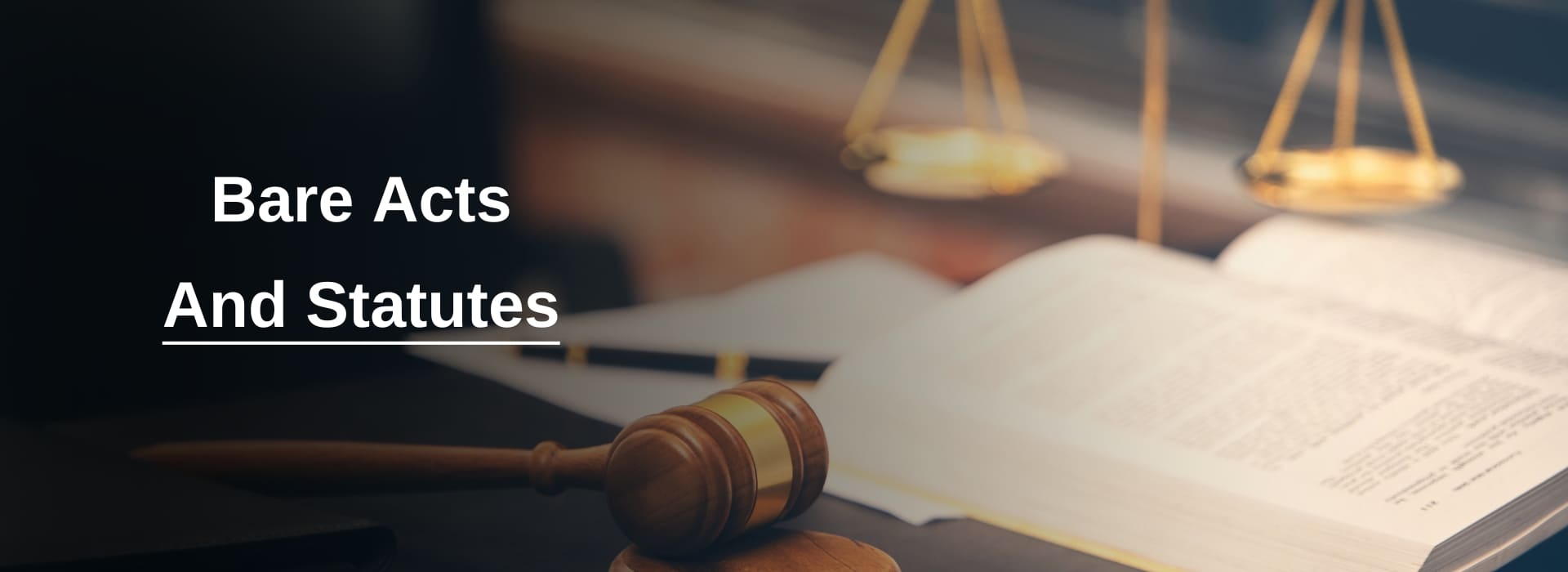
Bare Acts and Statutes for Judiciary Exam Preparation
When it comes to preparing for judiciary exams, one of the most essential tools you’ll need are Bare Acts and Statutes. These are the foundation of law and will form the core of your exam preparation. But what exactly are they, and why are they so crucial?
What Are Bare Acts?
Bare Acts are simply the exact text of laws as they appear in the legislation. They are a direct version of the law, without any commentary, analysis, or interpretation. These acts are created and passed by the legislature, and they govern various aspects of law in the country. Some examples include the Indian Penal Code (IPC), Code of Criminal Procedure (CrPC), and Constitution of India.
Bare Acts are essential for judiciary exams because examiners expect you to be familiar with the exact language of the law. Whether it's a question on criminal law, constitutional law, or any other subject, knowing the Bare Act helps you reference the law directly and answer questions accurately.

Why Do You Need to Study Bare Acts?
-
Precise Knowledge: In your exams, exact references to sections and provisions of Bare Acts are required. They test your knowledge of the law as it is written, and interpreting the law correctly is vital.
-
Clear Understanding of Legal Language: Bare Acts are written in technical, formal language, and studying them will help you get familiar with how law is structured and worded.
-
Helpful for Answer Writing: In judiciary exams, you’ll be required to quote specific sections and provisions. Studying Bare Acts will ensure that you can do this efficiently and accurately.
-
Exam Pattern: Most judiciary exams include multiple-choice questions and descriptive questions that require direct references from Bare Acts. If you know these Acts well, you’ll be able to answer with confidence.
How to Study Bare Acts Effectively?
-
Start with Key Acts: Begin with the most important Acts like the Indian Penal Code (IPC), Criminal Procedure Code (CrPC), Indian Evidence Act, and the Constitution of India. These are frequently asked in judiciary exams.
-
Understand the Structure: Bare Acts are often divided into sections, chapters, and subsections. It’s important to understand the structure and numbering system of these Acts to locate sections quickly during exams.
-
Take Notes: While Bare Acts can be overwhelming due to their detailed language, make sure to take notes as you go. Write down important definitions, sections, and concepts in simpler words for easy revision.
-
Use Commentaries and Case Law: While Bare Acts are essential, it’s also helpful to refer to commentaries or case law for deeper understanding. These resources explain the application of the law in real-life situations.
-
Practice with Past Papers: Go through previous years’ questions and mock tests to see how Bare Acts are tested. This will help you understand the kind of questions that come from these Acts.
-
Consistency: Studying Bare Acts requires consistency. Dedicate specific time every day to reading and revising these Acts. Make sure you’re not just reading but actively engaging with the content by making notes and writing summaries.

Where Can You Find Bare Acts?
-
Printed Copies: You can find Bare Acts in bookstores or legal bookshops. These often come with a commentary or explanation alongside the text.
-
Official Government Websites: The Ministry of Law and Justice and other official government websites often publish Bare Acts for free. You can download them and study directly from there.
-
Online Legal Platforms: There are various online legal resources like IndiaKanoon, Manupatra, and BareActs that provide digital copies of Bare Acts.
-
Coaching Institutes: Many coaching institutes, like Judex Tutorials, provide students with updated Bare Act compilations to ensure they have the most accurate and recent law texts.
Some Key Bare Acts to Focus On:
- Indian Penal Code (IPC): The backbone of criminal law in India, covering crimes, punishments, and procedures.
- Criminal Procedure Code (CrPC): Defines the procedures for the administration of criminal law in India.
- Indian Evidence Act: Lays down the rules for evidence in judicial proceedings.
- Constitution of India: The supreme law of India, dealing with fundamental rights, duties, and the structure of the government.
- Civil Procedure Code (CPC): Governs civil litigation procedures in Indian courts.
- Contract Act: Governs the law of contracts in India, including agreements and enforceability.
- Family Law Acts: Includes the Hindu Marriage Act, Muslim Personal Law, and others, which are important for understanding marriage, divorce, and inheritance.
- Negotiable Instruments Act: Governs the law of cheques, promissory notes, and other negotiable instruments.
- Companies Act: Governs the regulation of companies in India.
Studying Bare Acts is fundamental to success in your judiciary exam preparation. While it may seem difficult at first, with regular practice and the right approach, you can master the Bare Acts. Be sure to study regularly, make detailed notes, and don’t hesitate to refer to additional resources for clarity. Remember, the law is as much about understanding its essence as it is about remembering its exact provisions. So, take your time, practice diligently, and you’ll see your exam preparation improve significantly!